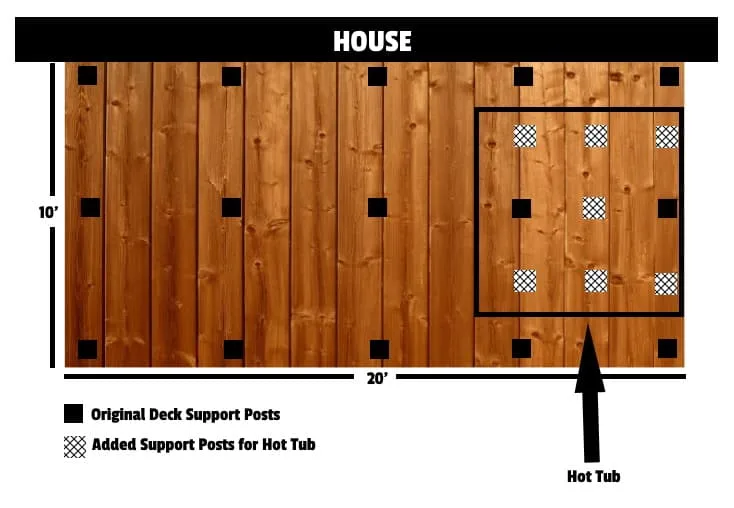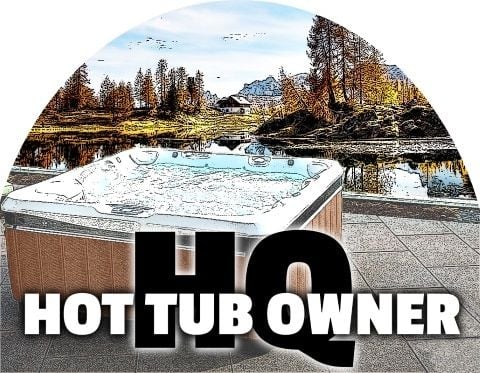I’ve owned 4 hot tubs, but until our current one, they’ve always been on a stone or concrete pad. Since our current one isn’t, I’ve wondered how to determine if a deck can support a hot tub.
Yes, you can put a hot tub on a deck. Decks built ground level up to 2 feet off the ground can support up to 100 lbs per square foot; sufficient for most hot tubs. But decks 2 feet or higher will need added support. The added support posts should be no more than 30″ apart & ideally placed in poured concrete.
But there’s a lot more to know about hot tubs and decks. After all, hot tubs, full of water, and people can easily weigh over 5,000 lbs.
So in this article, we’re exploring how to safely put a hot tub on an existing deck.
But we’ll also get into calculating how much weight your deck can support, where to add additional supports to an existing deck. And click here to see what you need to consider if you’re building a deck for a hot tub.
Let’s get going!
Ready to Spend Less Time On Maintenance and More Time Enjoying Your Hot Tub?
Let’s face it. Balancing the water, cleaning filters, dealing with rashes, and trying to figure out which chemicals to buy and add can make you feel more like a chemist than someone who just wants to relax after a long hard day!
That’s exactly why The Hot Tub Handbook and Video Course is so valuable!
This is from Matt over at Swim University and he developed it for people looking to save money, time, and frustration. His tips on chemicals can save you $100/year just by making sure you buy only what you need.
So if you’re ready to stop being confused or frustrated with your hot tub and start spending more time in it, check out The Hot Tub Handbook and Video Course.
Just click that link to learn more on their website.

How much does a hot tub weigh?
Before we answer this, let’s look at the different kinds of hot tubs, since each will be different. Let’s also assume we’re NOT talking about in-ground hot tubs.
We have:
- Small 2-3 person hot tubs
- Medium 4-5 person hot tubs
- Large 6-8 person hot tubs
- Inflatable hot tubs
But the average hot tub weight, empty, is about 500 lbs. Of course, it’s always a good idea to check with your manufacturer about your specific model.
Here’s a handy chart showing an estimate of each of those and how much they weigh (roughly) empty, full, and at capacity with occupants:
| Type of Hot Tub | Empty | Water Only | People & Water |
| Small 2-3 person hot tubs | 600 lbs | 2,575 lbs | 3,000 lbs |
| Medium 4-5 person hot tubs | 750 lbs | 3,700 lbs | 4,420 lbs |
| Large 6-8 person hot tubs | 800 lbs | 4,300 lbs | 5,500 lbs |
| Inflatable hot tubs (2-3 people) | n/a | 2,200 lbs | 2,700 lbs |
| Inflatable hot tubs (4-6 people) | n/a | 2,700 lbs | 3,700 lbs |
Want to calculate the weight of your hot tub more accurately?
Click here to read my ultimate guide on how to calculate the weight of your hot tub precisely. I get into all shapes and sizes and give you a few different ways to calculate your weight quickly and easily!
These solid deck boards are great for areas of high footfall or weight, such as under a hot tub or any commercial application. pic.twitter.com/AOYH3McPs4
— Rinato Decking Boards (@rinatodecking) February 20, 2020
Can a deck support a hot tub?
As you can see from the above chart, a hot tub full of water and people weighs a lot!
Given how relatively small most hot tubs are, that’s a lot of weight concentrated into a fairly small area on your deck.
So just know that a normal deck raised 2 or more feet off the ground, which might have support posts every 6 feet, won’t be enough to hold the weight of a hot tub.
The good news is that if your deck is high enough off the ground to get under, it’s fairly easy to add support beams and posts to take the weight of your hot tub.
The other good news is that if your deck is just above ground level, you aren’t likely to need additional support.
When in doubt, I would have a general contractor inspect your deck and tell you if it will require additional support.
That being said, if you have a deck that’s just over the ground, it can take about 100 lbs per square foot.
That IS enough to hold most small to medium-sized hot tubs with water and people. But fear not, we’re getting into the exact calculations below.
Looking to get a quote on a new hot tub?
Save time and receive multiple quotes for hot tubs from all the best-known brands!
I have arranged with BuyerZone.com to provide free quotes from all the best hot tub manufacturers – with no obligation to buy. Simply complete BuyerZone’s request form below.
How to calculate the load bearing requirements of a deck
The higher your deck is off the ground, however, the less weight per square foot it can take.
Let’s break it down, using the large 6-8 person hot tub in my chart above as an example.
- Weight of the spa (empty) = 800 lbs
- # of gallons of water (525) x 8.34 lbs (how much a gallon weighs) = 4,378.50
- Add those 2 numbers = 5,178.50
- # people (8) x 175 (average weight of user) = 1,400 lbs
- Add that number to the previous total = 6,578.50
- Divide that by the number of square feet (64) = 102.79
So as you can see, the largest hot tub is just a hair over 100 lbs per square foot, and that’s if 8 people are in it. For many of us, we won’t have 8 people in our tubs at one time, and we might also have a smaller hot tub.
Need an easy way to calculate square footage? Check out this handy calculator from Calculator Soup.
So if that’s you, and, as I said above, if your deck is ground level or under 2′ off the ground, you should be just fine with no additional support. Of course, that’s assuming your deck was well-built in the first place AND is still in great shape.
Now you might be thinking if you have an inflatable that it’s nothing to worry about.
Think again! Click here to read my guide on inflatable hot tubs and whether your deck can support that weight. After all, while the hot tub itself weighs next to nothing, the water, and people’s weight will be unchanged.
We got the lights on the deck! Hot tub arrives Monday morning! pic.twitter.com/nXZhm7wcU7
— Scott Dellinger (@scottdellinger) May 15, 2021
What are the best deck materials for a new deck for a hot tub?
When building a new deck for a hot tub, it’s crucial to consider the best deck materials to ensure structural integrity and safety. Consulting a professional contractor and, if needed, a structural engineer is advisable to assess the load-bearing capacity of your existing deck and determine the best option for your specific situation.
The deck surface should provide a secure footing, even when wet, to prevent slips and falls. Different materials offer various benefits:
- Pressure-Treated Wood: This is a popular and cost-effective option for deck frames. It resists rot and decay, making it durable and suitable for outdoor use. However, regular maintenance is necessary to keep the wood in good condition.
- Composite Decking: Made from a combination of wood fibers and recycled plastic, composite decking is low-maintenance and highly durable. It doesn’t splinter or rot and is resistant to fading and staining, making it an excellent long-term investment.
- Cedar and Redwood: These natural woods are naturally resistant to decay and insects, giving them a longer lifespan than other wood options. They also offer a beautiful aesthetic appeal, enhancing the overall look of your hot tub area.
- PVC or Vinyl Decking: This material is known for its resistance to moisture, making it ideal for wet environments like hot tubs. It doesn’t require staining or sealing, making maintenance hassle-free.
Ultimately, the best deck material for a hot tub depends on your specific needs, budget, and the existing structure of your deck. Consulting with professionals will help you make an informed decision to ensure a safe and enjoyable hot tub experience for years to come.
How can I modify my deck to hold a hot tub?
Wondering how to reinforce a deck for a hot tub?
For decks that are high off the ground and/or need additional support, here is a diagram showing you how my deck and hot tub are arranged with the additional support posts that were added under the hot tub area.

Bear in mind, this is what was done at my house (by the previous owners). You should consult a general contractor and check with your city planning office for guidance and permit info.
The added support posts are 30″ apart from one another. Posts ideally would be placed in poured concrete and run at least 1 foot below the frost line.
Of course, if you are modifying an existing deck, take great care to ensure that all footings, joists, and decking are perfectly sound and that no evidence of rot is present.
Spend a four day weekend on the deck and in the hot tub. Challenge accepted. pic.twitter.com/B8yxOw3uTR
— Ethan Rogers (@ERogers1991) April 8, 2021
Can a Trex deck hold a hot tub?
Yes, is the short answer.
Trex is simply a brand name for what’s called composite decking. That’s a fancy way of basically saying fake wood or plastic decking.
Now, I’m not knocking it, but since most of us don’t speak contractor-ease, I wanted to be clear about what Trex is as most of us have seen it.
Composite decking is roughly 20% more expensive than traditional pressure-treated lumber, so it doesn’t fit into every budget.
Now Trex isn’t stronger than traditional wood, so to calculate whether or not you need additional support under your deck to hold the weight of a hot tub, follow my calculations above.
The advantage of Trex comes from the fact that it, like all brands of composite decking, won’t splinter, crack, or rot. Further, it also is highly resistant to mold, mildew, and moisture in general.
While a traditional wood deck might last up to 15 years, Trex and most brands of composite wood will likely last 25 years or more, and most come with a 25-year warranty.
Is my existing deck structurally sound enough for a hot tub?
Before installing a hot tub on your existing deck, it’s essential to assess its structural integrity. Start by checking local building codes and regulations, as they may have specific requirements for adding a hot tub to a deck.
Consider your deck’s load capacity, especially if it’s a raised deck. Older decks may not have been built to support the weight of a hot tub, so it’s crucial to ensure it can handle the additional load.
To determine if your deck can support a hot tub, you’ll need to calculate the total weight of the hot tub when filled with water and occupants. A typical hot tub can weigh several thousand pounds, so proper structural support is vital.
Evaluate the type of material used for your deck. Different materials have varying load-bearing capacities, and some may be better suited for holding the weight of a hot tub.
Consulting with a professional contractor or a structural engineer is highly recommended. They can assess your deck’s condition, evaluate the feasibility of a hot tub installation, and provide necessary modifications or reinforcements if needed.
Additionally, look for signs of wear and tear, such as rot, decay, or loose connections. These issues may compromise the deck’s stability and require repair before proceeding with a hot tub installation.
Remember, the safety of your hot tub installation relies heavily on the structural soundness of your existing deck. Taking the time to evaluate and ensure the deck’s ability to handle the load will provide peace of mind and an enjoyable hot tub experience for years to come.
Is a recessed hot tub better on a deck?
Having a recessed hot tub on a deck offers several benefits, making it a popular choice for many homeowners. One of the main advantages is the aesthetics. Recessing the hot tub allows it to blend seamlessly with the deck, creating a more cohesive and visually appealing outdoor space.
Access panels are an important consideration for a recessed hot tub. These panels provide easy access to the hot tub’s plumbing and electrical components, making maintenance and repairs more convenient. Ensure there’s enough space around the hot tub for these access panels to open and close easily.
The weight of the hot tub is another crucial factor to consider. A recessed hot tub must be properly supported to withstand its weight. Reinforcements to the deck’s structure may be necessary to ensure it can handle the additional load.
When the hot tub is recessed, its top is typically closer to the deck level, making it easier to step in and out of the tub. This can be especially beneficial for those with mobility issues or for families with young children.
The overall design of a recessed hot tub creates a more inviting and integrated outdoor space. It offers a seamless transition from the deck to the hot tub area, enhancing the overall aesthetics of your backyard.
It’s essential to ensure there’s enough clearance around the hot tub when it’s recessed. You want to have ample space for safe entry and exit from the tub, as well as space for sitting and moving around comfortably.
Keep in mind that the installation of a recessed hot tub requires careful planning and proper execution. Working with a professional contractor or hot tub installer is recommended to ensure the project is done correctly and safely.
Can I put an inflatable hot tub on my deck?
Yes, is the short answer.
Because inflatable hot tubs weigh almost nothing when empty, they are quite a bit lighter than a permanent hot tub.
Using the example in my chart towards the top, we see that even a large inflatable hot tub will likely be about 2,000 lbs lighter when full of water and people than the equivalent regular hot tub.
If we apply the formula I mentioned above for a large inflatable hot tub, we have:
- Weight of the spa (empty) = virtually nothing
- # of gallons of water (290) x 8.34 lbs (how much a gallon weighs) = 2,418.60
- Add those 2 numbers = 2,418.60
- # people (6) x 175 = 1,050
- Add that number to the previous total = 3,468.60
- Divide that by the number of square feet (38.37) = 90.40
So, again, for decks that are basically ground level, most likely you’ll be just fine with no added support for a large inflatable hot tub.
For a deck that is 2 or more feet above the ground, even though it’s not nearly as heavy as a full-sized, non-inflatable, I would still recommend adding the extra support; who knows? You might eventually want to add a full-sized hot tub later on!
Final thoughts
In this article, we took a look at hot tubs sitting on decks.
We explored not only whether that’s a good idea or not, but also how to figure out how much a hot tub weighs (when full). But we also looked at how to figure out how much weight your deck can take.
Ultimately, we answered how to determine if a deck can support a hot tub.
Is your deck on (or going to be) on a deck?
While your deck may only last 15 years, many wonder just how many years a hot tub will last. In a recent article, I break down exactly what the expected lifespan is of in-ground, above-ground, and even inflatable hot tubs.
I even let you know some key tips on maximizing that lifespan too, including the one thing sure to shorten your lifespan by years.
Just click the link to read it now on my site.
- Relxtime 6 Person Square Inflatable Hot Tub (2024 Review) - March 11, 2024
- Hot Tub Cover Mold – Complete Cleaning Guide - February 20, 2024
- Hot Tub Heater Longevity: How Often Should You Replace? - December 14, 2023


